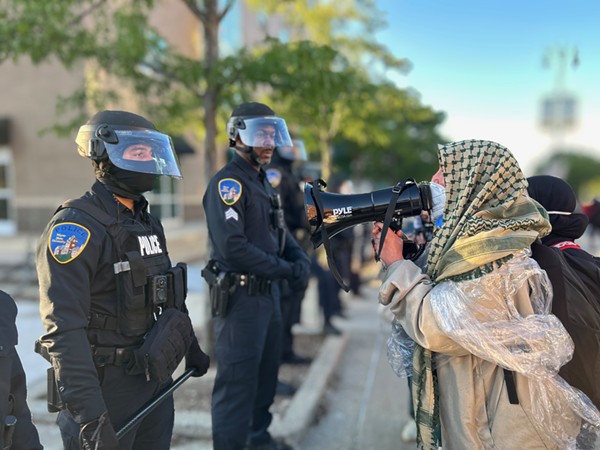
Steve Neavling
A Muslim activist yelled at Wayne State University police on May 30: “40,000 dead, and you’re arresting us instead!”
At Wayne State University, democracy is ducking behind a computer.
The university’s elected Board of Governors is going virtual for its next public meeting for the first time since the COVID-19 pandemic. By doing so, the board is avoiding face-to-face encounters with student and faculty protesters who have been rallying in support of Palestinians.
In addition, the board moved the public comment period from the beginning of the meeting to the end, making it impossible for students and others to address issues on the agenda before they are voted on.
Exactly two months before the Wednesday, June 26, virtual session, campus police forcibly removed protesters from the last meeting, prompting more than 100 faculty and staff members to denounce the “racist assault” on students who were calling on the university to divest from companies linked to Israel.
It’s also the first public board meeting since campus police resorted to violence after tearing down a protest encampment on May 30. Some faculty and staff members even called for the resignation of WSU President Kimberly Espy for her handling of the protests.
Pro-Palestinian students and faculty members rebuked the board’s decision to go virtual, saying it’s clearly an attempt to silence dissent.
“They moved it virtually as a defensive move so they would be able to get their word out without having any face-to-face interactions with the people they are elected to serve,” Ridaa Khan, a WSU student senator and pro-Palestinian activist, tells Metro Times. “Many of the students, staff, and faculty are upset and want this opportunity to address the board. A campus is supposed to promote free speech. This is setting a dangerous precedent. The genocide is continuing, and we are not being heard.”
University leaders also appeared to renege on their promise to engage with students about the possibility of divestment. While trying to get students to abandon the encampment, WSU officials said the board would take up the issue at its next board meeting after hearing from students.
That won’t happen now that public comment has been moved to the end of the meeting.
“That messaging was part of an attempt to dismantle our encampment before they met any of our demands,” Khan, an undergraduate majoring in media arts and studies, says. “They told us to attend the meetings. Now they’re changing the terms of the meeting.”
Sticking to their lack of transparency, the WSU Board of Directors declined to answer questions from Metro Times and referred the issue to the administration’s public relations team. University spokesman Bill Roose declined to say whether the virtual meeting was in response to pro-Palestinian protests but issued a vague written statement.
“Meeting formats and locations are determined at the discretion of the Board of Governors,” Roose wrote. “The Board chose a virtual format for its June 26 meeting.”
Roose said members of the public can stream the meeting at wayne.edu/live and that anyone wishing to comment must submit their requests “up to 48 hours before the meeting.”
In other words, the board can meet wherever it wants.
Faculty members also expressed frustration and astonishment with the board’s decision to go virtual, saying the elected members are shirking their duties to be accountable and accessible. The board is also sending a message to students that their voices don’t matter, the faculty members say.
“It’s a complete slap in the face to the students, faculty, and staff who want to be heard,” one professor, who spoke on condition of anonymity because of fears of reprisal, tells Metro Times. “It’s incredibly disheartening. The Board of Governors has a responsibility to the students, and instead of engaging with them, they are saying, ‘Your input means nothing to us.’”

